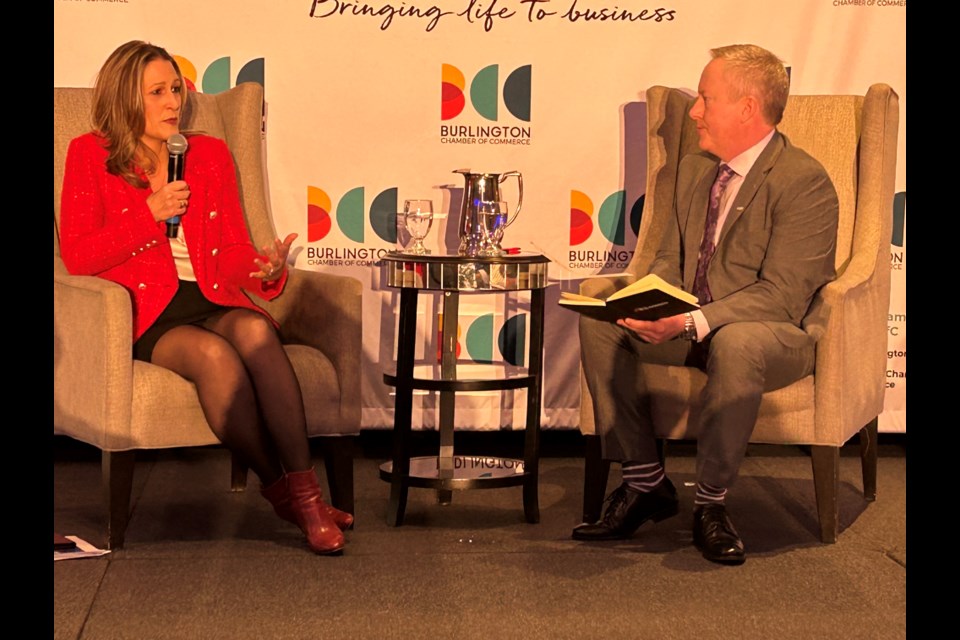Despite the previous night's heavy snowfall, turnout was strong at the Burlington Convention Centre Thursday (Jan. 26) for Mayor Marianne Meed Ward's State of the City address.
Organized by the Burlington Chamber of Commerce, the event hosted local business leaders who heard the city is facing many challenges as it tries to prepare for an influx of 70,000 new residents by 2050 while coping with the funding shocks of Bill 23.
Meed Ward said that 21,000 new residential units for Burlington are currently being processed, which will help the city meet the target of 29,000 new units by 2030 set by the province.
Burlington will not build into its Greenbelt area, Meed Ward promised, but the city is open for development "of the right scale in the right space with community vision in mind."
The city is trying to cut red tape around development and permits and to make progress easier to track online.
"We can't build our community without our friends in the development community, we can't serve our residents without our friends in business who provide services to our community," she said. "We can't do it all alone. We, on council, can't do it all without hearing from you and working together. And we certainly can't do it without all our staff."
Community and community centres
She added it is important to take a long-term view in growing the city, and a key element of Burlington's future will be the creation of communities — with community centres, parks and accessible services.
Two projects currently underway that will help meet those community goals are the Skyway Community Centre revamp and the redevelopment of the former Robert Bateman high school, which will become the largest community centre in the city.
"We have at least three more community centres that we need to plan for around each of our GO stations," Meed Ward added. "That is where the bulk of our new population is going to go."
The current community centres are too crowded, she added, and pointed out the city had waited too long on making improvements to Skyway in hopes of receiving provincial funding. As a result, the costs associated with the work spiralled as construction costs increased by 30 per cent since the COVID-19 pandemic.
The mayor said the city will be working on a parks, recreation and cultural assets master plan this year and seeking input from residents. "We know we need more ice, we know we need more pickleball courts," she said. "But we need more fields. We really need more of everything because we are at capacity."
The "disaster" of Bill 23
The mayor continued her vocal opposition to the provincial government's Bill 23 - More Homes, Built Faster. "One of the ways we pay for community centres and libraries and pools and parks is through development charges when new population moves," she said.
But these population movements never fully pay for themselves. "Taxpayers already subsidize the development of new homes by about 20 per cent," she said. "Bill 23 will create a giant hole in our budgets. At the Region, it is to the tune of $3 billion over 10 years... It is not something that will be solved with reserves and finding efficiencies."
Meed Ward said the city will continue to push through various associations for changes to Bill 23. "The discount on development charges will not build one more house, will not build one more affordable house. All it does is gut municipal finance. We will continue to fight that."
She asked developers to add their voices to those of municipal leaders in trying to reach the provincial government.
Later, in a Q&A session with Cogeco Senior Direct Tim Caddigan, Meed Ward said she hopes Premier Doug Ford can be reasoned with on municipal concerns around Bill 23.
"He used to be a municipal councillor, he should know how budgets work and why development charges are important," she said. "Why it's important for everyone to pay their share. Because all of what we want costs money. Community centres cost money. Somebody has to pay for it and I don't think it should be the taxpayer while we are enriching developers.
"I don't think that is the way to build great communities."



